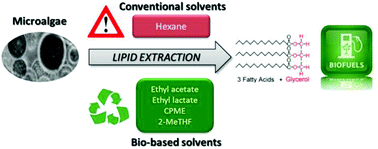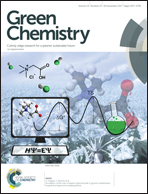Enhanced microalgal lipid extraction using bio-based solvents for sustainable biofuel production†
Abstract
Global energy crisis and climate change urge to find alternative energy sources to help in transitioning from a petroleum-based to a more sustainable bio-based economy. In this context, microalgal biomass is regarded as a promising renewable energy feedstock for biodiesel production due to its high lipid accumulation and growth rate. Conventional extraction methods for lipid recovery from microalgae rely on hazardous petroleum-derived volatile organic compounds (VOCs), such as hexane, which is being strictly regulated in the chemical industry. Therefore, the goal of this work is to assess the feasibility of using renewable bio-based solvents for microalgal lipid extraction to develop environmentally-friendly biofuel production processes. In particular, lipid extraction studies were conducted on two microalgal strains, Chlorella vulgaris and Nannochloropsis sp., via the Soxhlet method using various bio-based solvents (i.e. ethyl acetate, ethyl lactate, cyclopentyl methyl ether (CPME) and 2-methyltetrahydrofuran (2-MeTHF)), compared to the benchmark VOC solvent (hexane). All bio-based solvents outperform the extraction capacity of hexane, with 2-MeTHF and ethyl lactate, respectively, providing two-fold and three-fold lipid extraction yields in comparison with the conventional solvent, hexane. Moreover, fatty acid methyl ester (FAME) profiles produced from both strains indicate the suitability of bio-based solvents to extract target lipids for biodiesel production. In addition, the overall biodiesel yield is significantly increased when using bio-based solvents for microalgal lipid extraction, with 2-MeTHF duplicating the overall biodiesel yield provided by hexane in both strains, Chlorella vulgaris and Nannochloropsis sp. Lipid extraction with ethyl lactate also duplicates the overall biodiesel yield produced from Chlorella vulgaris. Furthermore, bio-based solvents decrease the level of polyunsaturated fatty acids present in the extracts, hence increasing the biodiesel quality for practical applications. Overall, bio-based solvents exhibit the potential for replacing hexane in developing sustainable processes for biodiesel production. Thus, these findings support the role of renewable solvents in developing eco-efficient processes for biofuel production towards building a bio-economy based on renewable sources.



 Please wait while we load your content...
Please wait while we load your content...